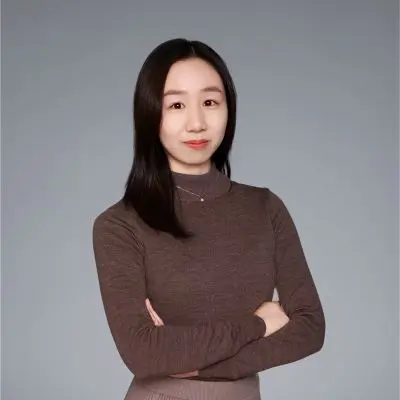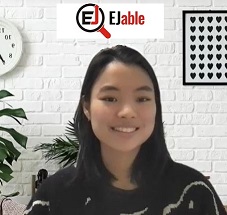Interview with Qing Yun Lan of Accenture, Japan
Name: Qing Yun Lan
Title: IT Consultant
Organization: Accenture, Japan
Date of birth: August 4, 1995
Hometown: Shanghai, China
Living in Japan: Since 2017
LinkedIn: https://www.linkedin.com/in/qing-yun-lan-376b52a9




This is the 14th interview in the “Interviews with Foreign Information Technology Engineers in Japan” series. “ EJable.com’s Ryoko Nagai talks to Qing Yun Lan of Accenture, Japan.
Video Interview with Lan
Transcript of The Video
Ryoko: To. Hi, Lan. Thank you for joining us today at EJable. I’m very excited to hear your story, especially since you are from a company that we have never had the chance to interview.
I’m also excited to learn about your experience not just as a foreigner in Japan but also as a female IT consultant. So, if you could please give us a little bit of your introduction, we would be very grateful.
Qing Yun Lan: Oh yeah 😊, thanks for inviting me for the interview.
My name is Qing Yun Lan, and I am from Shanghai, China. I came to Japan seven years ago, and right now, I’m working with a foreign multinational consulting company in Tokyo, Japan.
Right now, my work is mainly related to creating IT services for clients in the governmental and healthcare industries. So, my work is mainly related to programming and service design with my team. I’m quite interested in my work, and I also like hanging out or attending some technology events in Tokyo.
Ryoko: Oh, OK.
So, to begin your story about how you are here in Japan, could you tell us about your initial interaction or encounter with Japan or the reason you decided to come to Japan?
Qing Yun Lan: OK, actually, at my university, I also learned Japanese.
Ryoko: Oh, OK.
Yeah, I started learning Japanese in university and also started to learn about Japanese culture. During that time, I got a chance to have an exchange program and came to Japan.
I love Japan 😊 and its culture, so when I decided which graduate school I wanted to attend, I chose Japan.
Ryoko: OK, I see.
So, if you have been studying Japanese since your university days, do you speak Japanese very fluently?
Qing Yun Lan: I may not be as fluent as native speakers, but I usually communicate with my colleagues in Japanese in my daily work.
Ryoko: Oh, OK.
Qing Yun Lan: So, like business level.
Ryoko: OK, I see. And do you never use English in your work environment?
Qing Yun Lan: Sometimes, I use English in my work because there are many other foreign colleagues in my company. So, I communicate with them in English.
Ryoko: OK.
Qing Yun Lan: I also love attending tech events in Tokyo. Many foreigners usually attend these events, so I communicate with them in English.
Ryoko: OK. OK, I see.
Then, moving on to your current position as an IT consultant at your firm, what do you like about your position?
Qing Yun Lan: The first thing I love about my position is that it is full of challenges. We have the chance to learn about different projects and also get involved in different teams.
So, in every project, we get access to different kinds of content and learn a lot of new things and new skills. As the teammates change, you need to work with different people, so you feel quite fresh every time.
Ryoko: OK.
Qing Yun Lan: The second reason is that I love doing service design programming.
One of the reasons I like it most is that you can use IT technologies to create many very meaningful things for society, and this is what I am doing right now. I’m doing some projects related to government, and these projects can contribute to the entire society as many people have access to them.
Therefore, every time after the project, you feel like you are doing something very meaningful and you are making contributions to the whole society.
Ryoko: Right. I see. Yeah, that’s a great point.
If you’re working on a project for the government or related to the government, does your team mainly consist of Japanese people?
Qing Yun Lan: Yes, most of them are Japanese, but a few foreigners are also there.
Ryoko: Oh. OK. I see.
And how do you feel working in teams with the majority of Japanese people? Compared to working in China, did you have to learn to adapt to their way of working or something like that?
Qing Yun Lan: I think one of the difficulties, or maybe not a difficulty, is just the language.
Japanese is not my native language, so sometimes I get a little bit confused when communicating with my Japanese colleagues, especially during some very difficult design parts of the projects. I think this is one of the most difficult parts of my work, but with other things like collaboration with my Japanese colleagues, I think everything is quite smooth.
In the meetings, we decide what part of things each person needs to do and then just do the things that we are assigned. If you have some questions, you can also raise them on the channel. We use MS Teams for communication, so sometimes we just raise questions in the MS Teams channels, and if there are some people who know the answer and know how to solve the problems, then you can just talk with them.
Ryoko: OK, I see.
So they’re quite communicative and helpful if there’s a language barrier!! OK, I see.
Well, you work with one of the top consulting companies in the world, and I would think that it must be quite international, maybe because it is also a global company. So, how is the working environment there? Can you do some hybrid work, or do you always have to go to the office?
Qing Yun Lan: In my current project, I work in a hybrid style. So it’s like four days in the office and one day of remote work. But in my company, the work style really depends on the project itself. Because some projects require going to the company every day.
Ryoko: OK. Ah, OK.
Qing Yun Lan: It also depends on the client’s needs. Some projects may need a lot of communication with the client, while others may have full remote work.
And in most projects, most of the people are Japanese, but in some, most of the people may be foreigners because it’s an international project.
Therefore, different projects in my company have different work styles. Also, some people may have to go to the office, and some may have to work at the client’s office.
Ryoko: I see. OK. So very different from project to project.
Qing Yun Lan: Yeah, it’s very different, yeah.
Ryoko: OK. So, moving on to the next question, do you find any differences in the project execution styles in Japan compared to China or maybe in previous companies you’ve worked at?
Qing Yun Lan: I think maybe, yeah. Well, for example, compared to my previous company, my previous company usually did service design with the company-owned service desk.
Ryoko: OK.
Qing Yun Lan: But right now, because it’s an IT consulting company, we mainly design services and also do projects for clients. So, it’s quite different. In my previous company, we mainly worked for ourselves. Moreover, because it’s a service created by the company itself, the service was already launched, and the work was mainly fixing bugs or launching some new functions.
Ryoko: Yeah.
Qing Yun Lan: And so we mainly worked on ourselves, and there was not much communication with the team, I felt.
Ryoko: Oh, I see.
Qing Yun Lan: Yeah, but right now, it’s an IT consulting company, and most of the projects are created from scratch, so you need to do the design and also communicate with the clients from the very beginning, and you need to create the service from the very beginning.
You need to think about how to design the project or the database, and you need to talk with your team about everything. It’s teamwork now, and how to collaborate with your teammates and how to make everything smoothly is quite important.
Ryoko: How big is your team, if I may ask?
Qing Yun Lan: Maybe 70 to 80 members, but different groups, like task group, developer group, design group, etc.
Ryoko: Oh, wow. I see OK.
Qing Yun Lan: And work style compared with China, well, I haven’t worked in China. After graduation, I worked directly here in Japan, so I’m not really clear about the work style in China.
However, there are also many Chinese colleagues in my company and I think we can work quite smoothly in the team.
Ryoko: OK. I see. Great. Then maybe the last questions regarding your work. Do you have any goals for your career here in Japan or a career as an IT consultant?
Qing Yun Lan: Oh, yes. In my position right now, I mainly do the development and sometimes the design service design in the team. After a few years, I wish I could gain more experience and lead the team to do the project.
Ryoko: OK, great.
Qing Yun Lan: I wish I could gain more experience in leading and managing a team because that’s another thing that I need to learn.
Ryoko: Yeah, I agree. I mean managing 80 people is quite a big task.
Qing Yun Lan: Yes. Yeah.
Ryoko: Do you have any tips or advice for interviews for people when they are applying for jobs in IT or consulting firms in Japan?
Qing Yun Lan: Oh yes. The most important thing is to find your interest area. Even in the IT industry, there are many different kinds of jobs and many different kinds of projects. So the most important thing is to get to know what kind of industry and what kind of work you want to do before applying for the job. Thereafter, you can start doing some investigation about different kinds of companies and to find what kind of career path you want to.
Ryoko: OK. How did you find what you wanted to do?
Qing Yun Lan: Actually, it’s quite a long way 😊 before knowing what kind of things I wanted to do.
In Graduate School, my major was media design and technology. During that time, I knew that I was interested in IT companies, but at that time. I was still not quite clear about what kind of position, what kind of work I really wanted to go for. However, after doing some internships in Japan, I started to have a full image of the work and then started to get to know what kind of thing I really wanted to do.
Ryoko: OK. Nowadays, there are many licenses and certifications. Do you think having these licenses or certificates helps when you are applying for a job?
Qing Yun Lan: I think it’s quite helpful, mainly during the interviews or when the interviewers see your resume. I think it’s quite important. However, it’s quite important to know what kinds of certificates you want to gain. Like, is the certification related to the position you want to apply for, that’s more important.
Ryoko: Right. Yeah, that’s a great advice. Thank you for that. Then, moving on to the social and outside-of-work aspects, were there any ideas that you had about Japan that have changed over the seven years that you’ve spent here, in a good way or in a bad way?
Qing Yun Lan: Well, maybe I think the work style.
Ryoko: OK.
Qing Yun Lan: Yeah. I think that during these years, mainly after the Corona, more and more IT companies offer more freedom in working style like the hybrid work style and also the collaboration with different people from different countries or different cultural backgrounds.
I think that’s the case in my company. Maybe because it’s a foreign company, there are a lot of foreigners in my company. So, you can do a lot of work and collaborate with people from different backgrounds and cultures. Yeah, it helps create more new insights in a company.
Ryoko: Ok. OK, I see. A lot of people tend to think that because Japan is such an island country, there may not be a lot of foreigners here, and the Japanese work environment is different. But I guess that’s changing a little bit by little bit.
The next question will be, what aspects of Japan or Japanese culture do you like or enjoy?
Qing Yun Lan: Umm, I like the exhibitions here.
In recent years, I think modern art in Japan has become increasingly interesting. It’s not just traditional art; sometimes, it also includes technological elements like VR or virtual things. So, I think the exhibitions here can be like a new identity of Japan.
Ryoko: Oh, OK.
Qing Yun Lan: And can bring a lot of new insights, yeah.
Ryoko: OK, so, is that how you spend your free time going to the exhibitions?
Qing Yun Lan: Yeah. Yes.
Ryoko: Around. OK. And how do you find these in exhibitions? Is it online through websites? Yeah. How do you get to know that these exhibitions exist?
Qing Yun Lan: Yeah, from online, and also from my friends. Many of my friends are also quite interested in these kinds of modern art exhibitions in Japan.
Ryoko: Uh-huh. OK.
Qing Yun Lan: Many IT Workers around me are also interested in technological things like robotics. So yeah, I also get a lot of information about the exhibition from them.
Ryoko: OK. Do you spend time with your colleagues or your team outside of working hours? In Japan, we have things like nomikai and these Kais or events or meetings outside of working hours. Is that something you do with your team as well?
Qing Yun Lan: Yes. So, every time a project ends, we have nomikai.
And also, we have shinnenkai, the New Year party, yeah.
Ryoko: OK. Do you enjoy these events with your colleagues?
Qing Yun Lan: Yet sometimes I quite enjoyed it. But sometimes I may get a little bit embarrassed if it’s a very big event with many people from other projects whom I haven’t met before. But I still feel happy to know a lot of new colleagues.
Ryoko: OK. Yeah, I see.
Then, are there any things that you don’t like about Japan or Japanese working culture?
Qing Yun Lan: Maybe not. I think I quite enjoy my life in Japan right now and also enjoy my work in my company.
Ryoko: Great. I’m not sure where you are from in China, but I think a lot of people have the image that Tokyo is such a big metropolitan city—filled with people and busy. How do you like Tokyo?
Qing Yun Lan: Right. I think Tokyo is a city full of fun.
At work, I feel like collaboration with my teammates is quite smooth. However, I also have many new challenges in getting access to different work.
In my free time, I sometimes go to those exhibitions I mentioned before. I have also made a lot of new friends through technological events and maybe sometimes with colleagues. Uh-huh, and the Japanese food here is quite good and delicious. I love sushi; I love sukiyaki. Yeah 😊.
Ryoko: Nice. 😊.
Qing Yun Lan: So I enjoy life here.
Ryoko: OK. Amazing. Has there been any place outside of Tokyo that you’ve visited that you’ve really liked and that you would recommend to people?
Qing Yun Lan: I think I will recommend Hokkaido.
Ryoko: Ah, I see.
Qing Yun Lan: It’s a place where you can have a lot of tasty and fresh food. Every season is quite beautiful.
Ryoko: OK.
Qing Yun Lan: Like, in the winter, you can see the snow, and in summer, you can enjoy the lavender 😊.
Ryoko: Oh, right. Yes, they have those big farms.
Qing Yun Lan: Yeah.
Ryoko: Yeah. OK.
Qing Yun Lan: It’s a really nice place I want to recommend.
Ryoko: OK, amazing. I should try going to Hokkaido. Yeah someday.
Then the last question from my side. Do you have any final tips or advice for those who wish to work in Japan or are looking for a job in Japan?
Qing Yun Lan: Yeah. So, if you can speak Japanese, then maybe you can try to make full strength of yourself to find a job. Maybe you can go to some Japanese companies that have foreign teams. You can also go to some foreign companies that need Japanese, so you can have full potential to do the work here.
But if you cannot speak Japanese and only speak English, you don’t need to worry because, in Japan, there are still many chances to get a great position. Some multinational companies have English-speaking teams. Some startups, even Japanese companies, want to be global, so they also need to create global teams in their companies.
Ryoko: Yeah, that’s great. Well, thank you for the advice and for your time today. I had a great time getting to know your story here in Japan. Thank you so much 😊
Qing Yun Lan: Thank you too 😊

